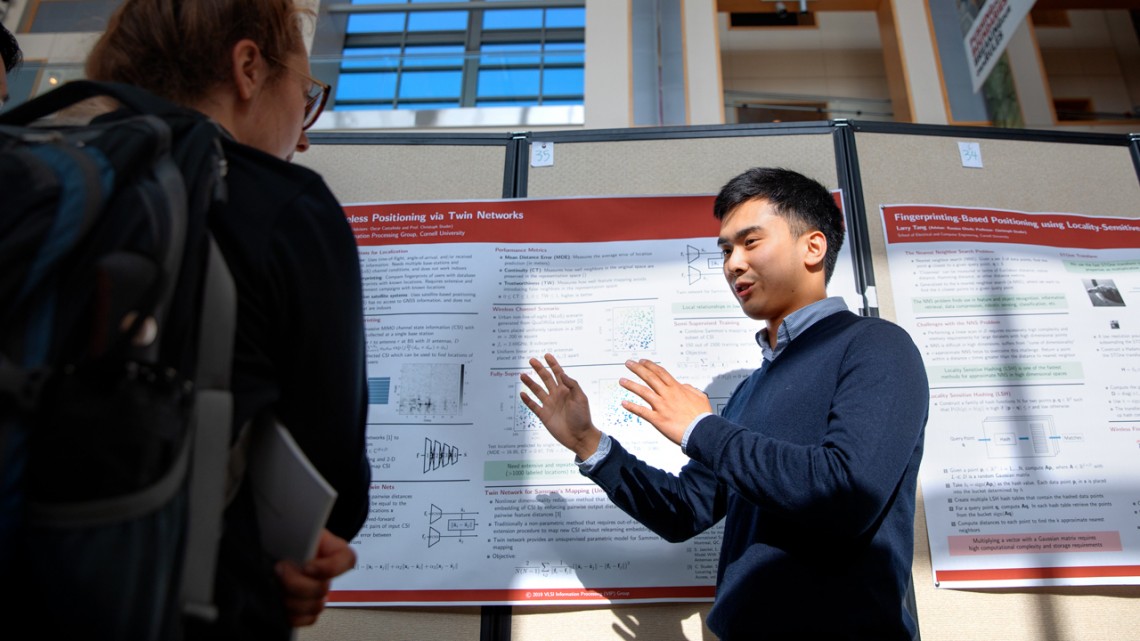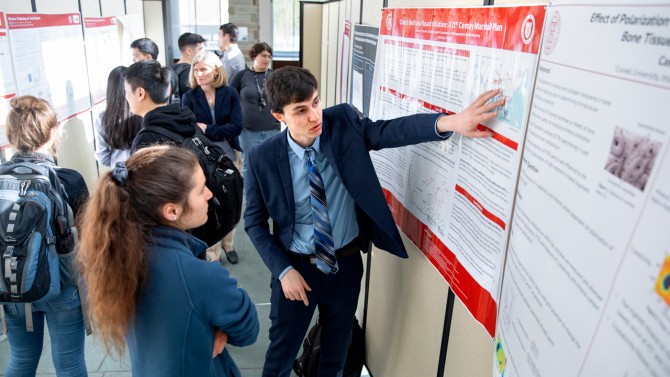
Eric Lei ’20 presents research aimed at identifying users in wireless systems during the CURB Spring Symposium Forum May 2 in Duffield Hall.
Student research has CURB appeal
By Matt Hayes
It’s a simple task for humans: Sort plants by the colors of their pots. For robots, though, it’s a much more arduous undertaking.
In a project blending technical savvy with lofty ambitions, a multidisciplinary team of Cornell undergraduates designed and built an autonomous robot capable of recognizing and handling potted plants.
“Climate change is becoming an issue, and there’s a growing need to increase efficiency in greenhouses and farms without increasing the cost of human labor,” said Yohan Sequeira ’19, a biological engineering major in the College of Agriculture and Life Sciences (CALS). “A robotics approach can maximize output without using more resources on farms.”
The student project was one of 84 presented at the 34th annual Spring Research Forum, May 2 at Duffield Atrium, hosted by the Cornell Undergraduate Research Board (CURB). The student-run symposium provides a space for undergraduates to present scholarly research in front of an audience.
For the robotics team, success depended on combining expertise in engineering, biology and computer science. The team approach is something Sequeira appreciated.
“Digital agriculture is becoming increasingly important, especially here at Cornell,” he said. “CALS is a huge pioneer and leader in this space, and that’s inspiring.”
The CURB forum aims to recognize student research achievement and provide a venue to communicate their work in a scholarly environment.
“One of the biggest challenges for science or humanities, or any kind of research, is to be able to communicate results effectively,” said Zain Mehdi ’20, of the CURB symposium committee. “We strive to encourage undergraduate research from all disciplines, and have them be proud of the work they’ve done.”
About a third of all presentations the past two years have been in the humanities, Mehdi said.
“We want to break down the stereotype that CURB is only about science,” he said. “We want to promote research of all kinds, and that includes English, history, public health, economics and other nontraditional research.”
Nobel laureate Harold Varmus, the Lewis Thomas University Professor of Medicine and a member of the Sandra and Edward Meyer Cancer Center at Weill Cornell Medicine, presented a guest lecture as part of the program.
Gillian Fennell ’19 considered a career in clinical psychology before a research experience in the Healthy Aging Lab pointed her in a new direction.
“I like asking questions that are really relevant and applicable to people’s lives,” she said. “Once I really dug into the ways you can use research to make healthy interventions for people and impact their lives that way, I was hooked.”
Fennell said the research and symposium experience prepares students for the next phase of their careers. In the fall, she will begin graduate studies in gerontology.
Danica Lee ’20, a biological sciences major in the College of Arts and Sciences, explored how social behavior impacts the gut microbiome in tree swallows. Creating her poster meant making decisions about the optimal way to present data in a clear and appealing way.
“Science is a collaborative process,” she said. “It’s important to share what you learn, and perhaps it can be adapted to a whole different system.”
Rob Raguso, professor of neurobiology and behavior, dropped in to learn about the projects and encourage the students.
“I remember what it was like being an honors undergraduate trying to crank out a thesis with a full load of courses and an uncertain future,” he said. “The symposium is a big moment for them – it’s a chance for them to tell their story.”
Scientific research teaches students to be diligent and scrupulous, Raguso said.
“The act of doing science is so important for our students to experience, and to experience with confidence,” he said. “Science is never over. Science is open-ended. We don’t know what we are going to get.”
No matter which direction they take their careers, Raguso said, the experience of researching a topic and presenting the findings has long-lasting, positive repercussions.
“They won’t think the same way again,” he said.
Media Contact
Get Cornell news delivered right to your inbox.
Subscribe

